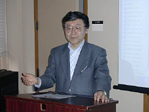GLOCOM Platform Stanford Seminar: Summary
Takahiro MIYAO (Professor, GLOCOM, and Head, Japanese Institute of Global Communications)
| Stanford Seminar on Japanese Pop Culture: |
| Date/Time: | February 24 (Thursday), 15:00 - 17:00 |
| Place: | Philippines Conference Room, Encina Hall 3 nd Floor, Stanford University |
| Program: |
Part 1: Presentations 15:00 - 16:00
Introduction:
Takahiro Miyao (Professor, GLOCOM)
Video Presentation 1:  Larry Kubota
Larry Kubota (GLOCOM Fellow)
Topic: Japanese movies
Video Presentation 2:  Seiichiro Yonekura
Seiichiro Yonekura (Professor, Hitotsubashi University)
Topic: Japanese games
Comments:
Takahiro Miyao
John de Boer (Post-doctoral Fellow, Stanford University)
Part 2: Free Discussions 16:00 - 17:00
Moderator: Takahiro Miyao
Participants: Stanford Researchers and Students
Topic: Japanese Asian Pop Culture
|
| Organizer: | GLOCOM Platform |
 Takahiro Miyao's Introduction Takahiro Miyao's Introduction
Welcome to our seminar on Japanese pop culture. I am Takahiro Miyao, Professor at the Center for Global Communications, which is located in Roppongi, that is a center of the Tokyo pop culture district. I have organized a research team to study Japanese pop culture, particularly focusing on the "soft power" of pop culture such as manga, anime, games and movies. Although we have not yet completed our research, we have tentatively concluded that there seems to be some kind of soft power that one can feel from Japanese pop culture, where soft power can be contrasted to hard power in terms of military power or economic power. Of course, it is not easy to measure that soft power per se, but there must be something to it. In our research we have used a number of proxy variables to make rough estimates of the soft power of Japan and compare them to those of other countries such as the US, EU member states as well as other Asian countries. Japan seems to be ranked very favorably in terms of soft power. In any case, today I would like to hear from you, students and researchers, here at Stanford as to how much you are attracted to or at least interested in Japanese pop culture and why. How do you compare Japanese pop culture with Hollywood entertainment or other Asian pop culture such as Chinese movies or Korean games? How do you see the future of Japanese pop culture in the US? Before discussing these issues, let's watch a video presentation by Dr. Larry Kubota, who is one of my research team members at GLOCOM.
(Larry Kubota's video shown to the audience)
Miyao's comment
Dr. Kubota has made a number of interesting points that we will take up in our discussion session, but let me point out that one of the strengths of Japanese movies is interesting stories, according to Dr. Kubota. This has become apparent as more and more remake films based on the Japanese movies are becoming popular in the US, such as "Shall We Dance." But at the same time, Dr. Kubota has emphasized a weakness of the Japanese movie industry, which lacks talents and skills in carrying out global business, bridging the existing gap between Japan and Hollywood or between Japan and Asian movie industries. That is where he has found his business niche as a Japanese American, knowing the American way of doing business in the movie industry as well as the interesting features and creativity of Japanese movie contents.
Participants' responses
Dr. Kubota's point about the weakness of the Japanese movie industry in conducing global business is not necessarily shared by US observers. First, there may be a cultural factor such as barriers to Japanese movies or Asian movies in general from the viewpoint of American audiences. Second, some original Japanese movies such as "Shall We Dance" have been wildly popular in the US, and remake decisions are made solely on the business level. Third, some Chinese movies are quite well received in the US, although their marketing and business abilities don't seem to exceed their Japanese counterparts.
(Seiichiro Yonekura's video shown to the audience)
Miyao's comment
Professor Yonekura has studied the history of manga, anime, and video games closely, and drawn some interesting conclusion about local creativity in a favorable business environment and also about the role of producers and managers in selling software output in the global market. He seems to imply that Japan is still strong in manga and anime, but may be losing competitiveness in games to the US and South Korea.
 John de Boer's comment John de Boer's comment
There are at least two possible explanations or factors for the popularity of Japanese pop culture. One is what might be called "structural factors," and the other "consumer preferences." One of the structural factors may be the role of middle-income families whose kids are exposed to and able to consume manga, anime and video games. On the other hand, consumer preferences could play an important role in adapting Japanese pop culture to the American audience. Films are often remade to suit local tastes and their authenticity is compromised in order to sell.
 Participants' responses Participants' responses
It is nice to see that Japan is now highly regarded as a kind of popular culture country, as many kids in the US are crazy about Pokemon and other anime/comic characters. However, there seem to be some fundamental structural problems with Japanese pop culture industry, because even Hayao Mizayaki needed a lot of financial support from Tokuma to get off the ground, and Tezuka Osamu's anime never made it to the US on a commercial basis. The industry people lack the sense of global business, still dependent solely on the Japanese domestic market, and the industry may be hollowing out as China and South Korea may be taking over the anime business.
It is frustrating to see an arbitrarily, often strangely, selected portion of Japanese pop culture introduced by non-Japanese businesspeople or distributors into global market, while Japanese industry people could do much better if they decide to market their contents globally. But, of course, the problem is that most of them are so domestically oriented and cannot handle international business themselves effectively, especially in the movie industry.
On the other hand, some Japanese business such as Sony has been doing very well in the international market. The Pokemon business has been a great success globally. So, Japan is not necessarily lacking talents in international business per se. Probably, a more recent challenge to Japanese pop culture may be how to customize Japanese mass products and contents to different segments of consumers in the global market. It would require a significant amount of investment to customize and localize Japanese contents to continue to be successful in the future.
Regarding "soft power," Japanese pop culture may be playing an important role in bridging the existing gap between Japan and other Asian countries, as young generations in Asia are accepting more and more Japanese pop culture and caring less about historical wounds. Generally speaking, however, much of Japanese pop culture appears to be removed from its tradition and history and, therefore, not many people can recognize it as Japanese. For example, Pokemon or Mario brothers don't look like Japanese characters at all. This may defeat itself as soft power for Japan.
It is interesting to note that Japanese traditional culture seems to have tremendous variety and depth, especially compared to American tradition, and Japanese pop culture seems to have the same traits, particularly in terms of fantasy, while the reality of Japanese society appears to be more uniform and homogeneous. This might explain why Japanese video games full of fantasy have been so successful, while Americans seem to be more successful in developing online (interactive) games by introducing a lot of reality, rather than fantasy.
When we look into the future, more and more contents will be resulting from international collaboration and products will be more and more difficult to be labeled as Japanese, Korean or Chinese. That is inevitable. If, however, the Japanese government wishes to utilize pop culture to beef up Japan's image, the government and business could work together to make it clear to consumers that certain products and contents are "Japanese" in some sense, as the Korean government is currently doing to sell their pop culture contents even though they are not entirely made in Korea.
Another problem may be that Japan does not seem to have any strong message to give to the outside world. Traditional Japanese culture used to be highly regarded by the Japanese themselves, but not any more. So, "soft power" may well be empty in substance. Although there are significant messages in some of the Japanese movies such as Hayao Miyazaki's, those messages are so soft that they tend to be left unnoticed by non-Japanese audience.
The future may be that Chinese pop culture in ten years from now will be like Japanese pop culture in the 1980s and 90s, as business people will be able to draw more from Chinese contents to be marketed in the US and elsewhere. However, one must take account of the fact that more and more contents will be resulting from international collaboration and, therefore, it will be difficult to label them as Japanese or Chinese. So it may depend on the country's effort to use pop culture to its advantage.
In response to the question as to what kind of pop culture contents each of the participants would like to see out of Japan in the future, a common answer seems to be something interesting and exciting in dealing with global issues from the Japanese perspective with real-life, not distorted, Japanese characters and landscape - something like the original Japanese version of "Shall We Dance," for example.
John de Boer's concluding remark
I would like to see Japanese pop culture as medium or a vehicle to encourage global dialogue by breaking down barriers and tackling controversial issues in Japan and elsewhere.
Miyao's concluding remark
You might check our GLOCOM Platform (www.glocom.org) and continue our discussions on the web. Please contribute your opinions or comments on Japanese pop culture to our Platform for further discussions. Thanks for joining us today.
|





